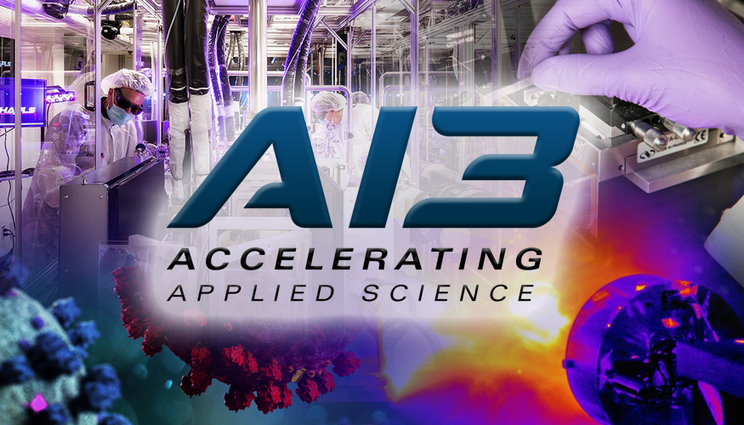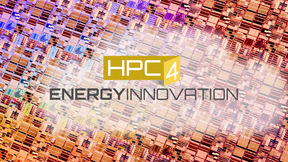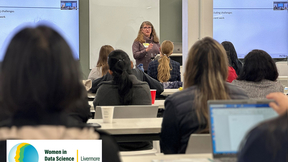LLNL establishes AI Innovation Incubator to advance artificial intelligence for applied science
 (Download Image)
(Download Image)
Lawrence Livermore National Laboratory’s AI Innovation Incubator (AI3) will serve as the foundation for a cohesive view of AI for Applied Science, built upon LLNL’s “cognitive simulation” approach that combines state-of-the-art AI technologies with leading-edge high performance computing. The hub is intended to stimulate new partnerships and enable LLNL, industry and academia to apply revolutionary AI methods.
Lawrence Livermore National Laboratory (LLNL) has established the AI Innovation Incubator (AI3), a collaborative hub aimed at uniting experts in artificial intelligence (AI) from LLNL, industry and academia to advance AI for large-scale scientific and commercial applications.
LLNL has entered into a new memoranda of understanding with Google, IBM and NVIDIA, with plans to use the incubator to facilitate discussions and form future collaborations around hardware, software, tools and utilities to accelerate AI for applied science. In addition, several existing projects will fall under the AI3 umbrella, including continued work with Hewlett Packard Enterprise (HPE) and Advanced Micro Devices Inc. (AMD) to demonstrate the power of AI and high performance computing (HPC) on the future exascale system El Capitan. This project focuses on innovative, AI-driven cognitive simulation and design optimization methods at unprecedented scales to devise novel approaches to inertial confinement fusion (ICF) experiments at the National Ignition Facility.
Other ongoing projects with AI accelerator/computing companies SambaNova Systems and Cerebras Systems and precision motion company Aerotech, Inc. will be further developed through AI3. More companies, universities and leaders in the AI space are encouraged to consider joining AI3, where early research areas are expected to include advanced material design, 3D printing, predictive biology, energy systems, “self-driving” lasers and fusion energy research.
“We want this Incubator to be a place where industry, academia and the Lab can come together, nurture ideas, grow projects and develop a common vision,” said Brian Spears, AI3 director and LLNL physicist. “This is about bringing smart people with a diverse set of views together to work on meaningful problems in ways nobody else can. AI is such a quickly evolving field that having these hubs as a vehicle to quickly plant the most important, most exciting new ideas from outside the Lab to inside — and vice versa – is vitally important.”
AI3 will serve as the foundation for a cohesive view of AI for Applied Science, built upon LLNL’s cognitive simulation approach that combines state-of-the-art AI technologies with leading-edge HPC. The approach has sparked improvements in models for ICF, predictive biology, advanced manufacturing and other areas.
The Incubator will provide an infrastructure for the Lab’s AI activities, both internally and externally. Advancements made through AI3 will feed back into the national security enterprise and strengthen LLNL’s primary missions. The hub is intended to stimulate new partnerships and enable LLNL, industry and academia to apply revolutionary AI methods, hardware and software to significant scientific problems.
"We're excited to collaborate on this technical research with responsible innovation top of mind," said Rif A. Saurous, research director at Google Research. "We're going to bring Google's deep expertise in machine learning and high performance computing to help accelerate scientific progress."
“IBM is pleased to participate with LLNL in AI3,” said IBM Future of Computing Systems Director James Sexton. “The integration of AI with traditional high performance computing and data analysis methods that is the focus of AI3 will generate fundamentally new and transformative knowledge based computing capabilities for analysis, reasoning and decision making.”
“Today’s greatest scientific challenges require a new approach – one that combines the latest advances in AI with traditional scientific computing methods,” said NVIDIA Senior Director of Accelerating Computing Paresh Kharya. “NVIDIA looks forward to collaborating with the Lawrence Livermore National Laboratory and fellow AI3 members to accelerate scientific research that can have a tremendous impact on our lives today and in the years to come.”
LLNL anticipates projects developed through AI3 to include advanced AI and statistical tools to improve predictive models for various scientific applications; applying molecular design methods used in drug discovery to the development of new classes of materials; coupling computational hardware with simulation to enable self-driving scientific facilities capable of making autonomous experimental decisions; and pursuing advanced AI methods for building detailed computer models of 3D printing and advanced manufacturing processes.
Through existing and future projects, LLNL and AI3 members also plan to develop and democratize large datasets to share with the broader scientific community and to create open benchmarks to run on some of the world’s fastest supercomputers, testing the limits and potential of AI at the largest scale of science and technology.
The AI3 leadership team will be responsible for establishing and executing the Incubator’s strategic direction, soliciting and selecting collaborative projects and building external partnerships. The multi-disciplinary team currently consists of AI leaders from across the Laboratory including Spears, LLNL’s Deputy Associate Director of Computing Jim Brase, Informatics Group Leader Brian Van Essen, Group Leader Michael Schneider and Michael Goldman, director of LLNL’s Data Science Institute (DSI). The Incubator will grow, diversify and strengthen its leadership team in the coming months to ensure all levels of perspectives and equities are captured and represented.
Over the next three years, AI3 leadership intends to expand existing collaborations and form new ones, publish AI for applied science datasets and benchmarks and spin-out projects from the Incubator to benefit Lab programmatic areas, the scientific community and the world. To help achieve these goals, AI3 will partner closely with DSI to cross-leverage their respective activities and form a synergistic union to help drive LLNL’s strategic AI vision forward.
AI3 also will propel DSI by providing unique opportunities to align its education, community outreach, and workforce pipeline activities. Likewise, these DSI activities will provide the foundation necessary to promote the visibility and available opportunities of AI3, as well as support selected collaboration hub projects and partnerships.
For more on the AI Innovation Incubator, visit the web.
Contact
 Jeremy Thomas
Jeremy Thomas
[email protected]
(925) 422-5539
Related Links
GoogleIBM
NVIDIA
AI Innovation Incubator
Tags
HPC, Simulation, and Data ScienceMachine learning
ASC
Computing
Science
Featured Articles







